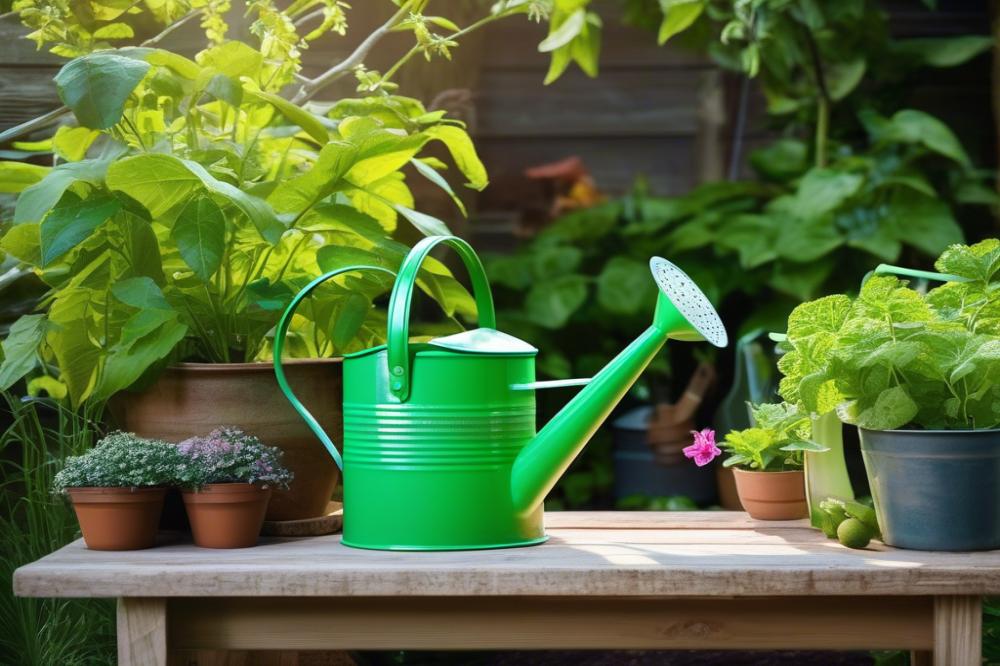Understanding compost tea: A Natural liquid fertilizer
fertilizers-improve-soil-structure-and-nutrient-availability”>organic gardening has gained popularity as more people seek sustainable ways to grow plants. One effective method that many gardeners employ is creating compost tea. This homemade fertilizer acts as afertilizers-for-succulents-maintaining-nutrient-balance”> nutrient-rich solution that provides a wealth of benefits for both soil and plants.
The process begins with composting, where organic materials decompose naturally over time. This creates a rich, dark substance that is high in essential nutrients. By steeping this compost in water, you extract beneficial microorganisms and nutrients that plants crave. The resulting liquid is known for enhancing soil health and boosting plant nourishment.
Utilizing compost tea in your gardening practices can lead to vibrant, healthy plants. It delivers liquid nutrients directly to the roots, promoting growth more effectively than some chemical fertilizers. The eco-friendly nature of this practice also aligns with the principles of sustainable gardening. Instead of relying on synthetic products, gardeners can tap into the power of nature.
Many gardening tips recommend using this solution to improve soil structure and activity. Regular applications can lead to an increase in beneficial bacteria and fungi, which are vital for a thriving ecosystem. As these organisms work in harmony, they break down organic matter, releasing nutrients back into the soil.
In summary, compost tea represents a unique way to nourish your garden and care for the environment. Embracing this technique allows for healthier plants, richer soil, and a deeper connection to the natural world.
What is Compost Tea?


Compost tea is a liquid extract that comes from steeping compost in water. It serves as a powerful homemade fertilizer for plants. Making this nutrient-rich solution involves soaking mature compost in water, allowing the beneficial microorganisms and nutrients from the compost to leach into the liquid.
Compost and compost tea differ in their form and function. The former is a solid material; it enriches soil directly when mixed in. On the contrary, compost tea is a liquid, making it easier to apply as a foliar spray or drench for plant roots. While both provide valuable nutrients, the liquid form can be absorbed more quickly by plants, ensuring faster access to vital nutrients.
Utilizing compost tea in your gardening routine offers several benefits for sustainable gardening practices. This eco-friendly option helps boost soil health and improve plant nourishment. It encourages microbial life in the soil, enhancing overall plant growth. Furthermore, making compost tea allows gardeners to recycle organic materials while avoiding chemical fertilizers.
Incorporating this natural liquid fertilizer into your gardening tips can lead to healthier plants and stronger yields. It’s an effective way to deliver liquid nutrients directly to your plants, promoting their vitality. Many gardeners find that using compost tea promotes resilience against pests and diseases, reducing the need for synthetic chemicals.
Benefits of Using Compost Tea


This homemade fertilizer offers an impressive array of nutrients that support plant growth. Rich in essential elements, it can dramatically improve soil health. Plants benefit greatly from the organic compounds present in the brew. Microorganisms thrive in compost tea, enhancing the biological activity in the garden. They work together to break down organic matter in the soil, turning it into nourishment for your plants.
Using this liquid nutrients solution can lead to healthier, more vibrant plants. Regular applications often result in stronger root systems. Enhanced growth not only contributes to larger plants but also increases resistance to diseases. Many gardeners notice that their plants yield more abundant fruits and vegetables, further validating the benefits of this eco-friendly practice. In organic gardening, such practices reduce the reliance on chemical fertilizers, promoting a more natural environment.
Another key advantage lies in its ability to improve soil structure. Healthy soil retains moisture better, reducing the need for frequent watering. Additionally, it helps protect against soil erosion, creating a sustainable gardening practice for the future. When creating compost, diverse materials can contribute to an optimal nutrient mix. This opens doors to a wider range of gardening tips and techniques tailored to individual plants and conditions.
Utilizing this natural liquid fertilizer not only nourishes plants but also encourages a thriving ecosystem. Pollinators and beneficial insects are more likely to visit gardens treated with eco-friendly solutions. As a result, biodiversity in the garden increases, further enhancing plant life. By integrating such sustainable methods, gardeners create a balance that can last throughout the seasons.
How to Make Compost Tea


Making compost tea at home is a simple and rewarding process. You will need a few essential ingredients to get started. Gather some mature compost, non-chlorinated water, and a breathable bag, such as a piece of old pantyhose, a mesh bag, or even a bucket with small holes in it. These are the building blocks of your nutrient-rich liquid fertilizer.
Choose between two brewing methods: aerobic or anaerobic. Aerobic brewing involves using air to promote the growth of beneficial microorganisms. To do this, fill your breathable bag with compost and place it in a bucket filled with non-chlorinated water. Using a small aquarium pump can help aerate this mixture, allowing the microorganisms to thrive. This method typically takes 24 to 48 hours.
If you need a quicker option, anaerobic brewing can be done without air. Simply combine the compost and water in a sealed container. Avoid using oxygen as much as possible. This method, while easier, may produce a stronger odor and requires careful handling. Brew it for about 3 to 5 days.
While brewing either way, make sure to stir the mixture occasionally. Stirring introduces oxygen and keeps the materials well mixed, enhancing plant nourishment. For optimal results, maintain a warm environment. Higher temperatures favor the growth of bacteria and microbes that contribute to soil health.
When ready, strain the mixture to separate the liquid from the solid matter. The resulting tea is now your homemade fertilizer. Use it as a foliar spray or water for your plants. It’s best to apply the solution immediately after brewing for the highest concentration of beneficial nutrients.
Consider adding additional ingredients for a more specific nutrient profile. For instance, you might include a small amount of molasses or fish emulsion to encourage microbial growth. Many gardeners enjoy experimenting with different ratios to discover what works best for their specific plants.
As an eco-friendly option, this method promotes sustainable gardening practices. By utilizing your compost, you recycle nutrients back into the garden. These practices are helpful for both your plants and the environment. Incorporating this homemade fertilizer into your routine can significantly improve soil and plant health.
Finally, remember these gardening tips: always test the compost tea on a small section of your garden first. Monitor your plants for any signs of distress or improvement. This way, you can adjust your approach and get the most out of your efforts.
Applying Compost Tea to Your Garden


Using compost tea effectively provides a wide array of benefits for your plants. Several methods exist for application, and each has its own advantages. Foliar feeding is a popular technique used to spray the nutrient-rich liquid directly onto plant leaves. This method allows for quick absorption of essential nutrients through the foliage, promoting healthier growth.
Soil drenching is another effective way to apply this homemade fertilizer. Pouring it directly onto the soil encourages beneficial microorganisms to thrive. Doing this improves overall soil health, which in turn enhances plant nourishment. When drenching, focus on the root zone where most plant activity occurs.
Seed Soaking for Stronger Starts
Giving seeds a soak can prepare them well for germination. Simply submerge your seeds in dilute compost tea for several hours before planting. This practice is known to boost the seeds’ viability. As they sprout, the introduction of liquid nutrients supports their early development.
Timing plays a crucial role in application. Early morning or late afternoon are ideal times for foliar feeding. Doing this minimizes evaporation and allows plants more time to absorb moisture. For soil drenching, applying after rainfall can enhance the benefits, as the soil is already moist, allowing for better infiltration.
Gardening Tips for Maximum Benefits
When applying any homemade fertilizer like this, consider the weather. Applying it just before rain can wash away the nutrients, diluting its effectiveness. Additionally, always check for any pests or diseases when leaf spraying to ensure you are not just feeding the problem.
Finally, practicing sustainable gardening means regularly evaluating your soil and plants. Keep an eye on how your plants respond after each application. Adjusting the concentration and frequency based on their needs can lead to stunning results over time.
Common Mistakes and Troubleshooting
Creating a nutrient-rich liquid fertilizer can be rewarding, but there are common pitfalls to watch for. One frequent mistake is not using quality compost. Using subpar materials can lead to weak tea that lacks essential nutrients. Always pick compost that is dark, crumbly, and has an earthy smell for the best results.
Another issue can arise from over-brewing or under-brewing. When you steep it too long, the tea can become anaerobic. This leads to foul smells and potential harm to plants. Striking a balance is key; a 24 to 48-hour steeping period usually works best. For a stronger mix, consider using aeration to promote good bacteria while brewing.
Water quality also plays a vital role in outcomes. Tap water, rich in chlorine or other chemicals, can harm microbes in your mix. Consider using filtered or rainwater to enhance soil health and encourage thriving ecosystems in your garden.
Some gardeners neglect to monitor the appearance of the tea. It should look dark, similar to weak coffee. If it’s overly cloudy or has a bad odor, it’s best to discard it and start over. Always trust your senses.
Storing it incorrectly can lead to spoilage. Fresh tea can last roughly a week in a cool place. Using it by then ensures that your plants receive optimal plant nourishment. Avoid exposing it to direct sunlight that could cause rapid degradation of nutrients.
Understanding the difference between compost tea and manure tea is crucial. Compost tea is more liquid in nature and less concentrated than its manure counterpart. Misusing either can lead to an excess of nutrients, resulting in plant damage. Always apply homemade fertilizer according to the needs of your specific plants.
Monitoring your plants after application is necessary as well. Look for signs of plant stress or improvement after using the tea. Adjust your approach based on their response to keep your garden flourishing. Incorporating these gardening tips will lead to successful sustainable gardening practices.
In summary, avoiding these mistakes while making this eco-friendly solution can maximize your results. Emphasizing quality, proper brewing time, suitable water, and careful storage will enhance your gardening experience. With awareness of these factors, you can enjoy a bountiful garden benefiting from the use of your nutrient-rich brew.
Final Thoughts on Using Compost Tea
In summary, we’ve explored the many benefits of creating a natural liquid fertilizer from compost. This practice not only enhances soil health but also boosts plant nourishment. By infusing gardens with organic material, individuals can support the vital ecosystem within their soil. Each batch of nutrient-rich tea serves as a powerful ally for any gardener aiming to foster vibrant plant life.
Embracing compost tea aligns perfectly with the principles of sustainable gardening. It reduces the need for synthetic fertilizers while actively contributing to the environment. The simple process of brewing this liquid gold allows anyone to recycle kitchen scraps and yard waste effectively. Doing so cultivates a healthier and more diverse garden, which is beneficial for both plants and local wildlife.
Readers are encouraged to experiment with making their own mixture. It can be a fun and educational activity that brings a deeper connection to the gardening process. By just following some straightforward steps, gardeners can enjoy a thriving garden while reducing waste. So, gather your compost and get started on this rewarding journey toward eco-friendly gardening.



